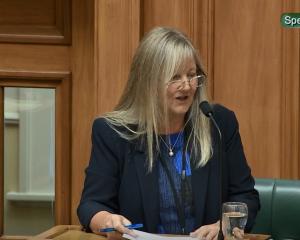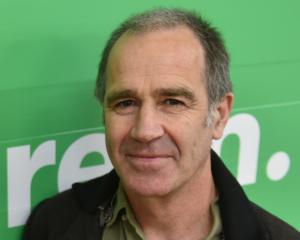In an usual move, he had hired four young attractive blonde reporters in a row to fill four consecutive vacancies, instead of four young alpha males.
It was assumed by his accusers that he had hired the women for their looks.
It was assumed that gorgeous young women couldn't be outstanding reporters - which of course they turned out to be because the seasoned old hack knew a good journalist when he saw one.
Jacinda Ardern, Labour list MP, suffers from the same syndrome as those women.
She is defined by many people by her good looks.
She gets an inordinate amount of coverage from an image-obsessed media.
That has led to a high-profile, high-public-recognition factor and public appeal.
It is for that reason that she was prematurely promoted by some quarters of the media - including my own paper - as the best choice to assume the position of Labour deputy leader over Annette King, who has been in the job for a year.
Labour leader Andrew Little's announcement this week he would be sticking with Annette King was the only sensible path.
Apart from the fact Ms Ardern was not actually seeking the deputy's job, sticking with Ms King was Mr Little's best call because high-functioning leadership teams are what win elections, not the image of a fresh face in the No2 spot.
Mr Little has made too much progress in developing his team with Ms King and Grant Robertson to change it on the basis of a few opinion polls showing her entering the preferred prime minister stakes at the margins.
It is triumvirate in a party, No1, No2 and the finance spokesman or minister who form the critical team, or a duo when the No2 is the finance person too.
Helen Clark and Michael Cullen were a high-functioning leadership team.
Mr Cullen was highly experienced and already finance spokesman when Miss Clark chose him as her deputy in Opposition.
He was chosen for the best of possible reasons - to neutralise him and the camp around him aggrieved at her failure to stand down as leader.
Miss Clark and Mr Cullen then had three years to rehearse their relationship in Opposition before assuming Government and perfecting it for the next nine years.
The most important element of the leadership relationship is trust - especially trust in each other's roles.
And Mr Cullen gave her no reason for distrust.
He famously quipped when asked the Government's view on a particular issue one winter: ''The Government is skiing at the moment''.
John Key chose Bill English for the same compelling reasons as Miss Clark chose Mr Cullen.
The English camp was aggrieved, not at Mr Key but at Mr Key's predecessor, Don Brash, and Mr Key recognised he needed them on board without harbouring any grievances.
They had a little less time together than Miss Clark and Mr Cullen but it has been a flawless partnership in terms of trust and at the heart of National's success.
The fact that Mr Robertson is Labour's finance spokesman makes it imperative he has a high-trust relationship with Mr Little.
The fact that Mr Robertson was preferred as leader by MPs and party members during last year's leadership contest is a complicating factor.
It does not make him a threat to Mr Little's leadership, but it must have started from an understandably cautious approach.
Ms King's role in the development of the leadership team cannot be overestimated.
She herself is the de facto chair of the policy committee and the key link between the caucus and the party.
In the coming year, they will need to have their roles finessed as the party prepares properly for the 2017 election - knowing what the others are likely to think, knowing when to consult, what the fiscal and political parameters are of policy coming before them.
Ms King supported Mr Robertson in the leadership contest but did not hesitate to answer Mr Little's call when he asked her to be deputy.
She is without peer - respected for her political and personal skills put to use in the caucus, in the party and in the leadership team.
She has been referred to as the ballast or the glue of the party.
Mr Robertson's office has been moved on Parliament's third floor to be close to Ms King and Mr Little.
There have been heavy investments in these relationships and there was no reason to change.
One need look no further than examples here or over the Tasman to see the consequences of dysfunctional and/or unstable leadership teams within a party: Kevin Rudd-Julia Gillard; Tony Abbott-Julie Bishop.
Back here too, observe: Jack Marshall-Robert Muldoon; Mr Muldoon-Jim McLay; McLay-Jim Bolger; and Jenny Shipley-Mr English.
In the improbable scenario in which Ms Ardern had become deputy over Ms King, there would have been one certainty: a string of speculation pieces by commentators from here to the next election on the prospect of Ms Ardern becoming the next leader.
An individual's image can be important within a party but it is worth nothing unless it is against a backdrop of stability and substance.
If you don't have the latter two, you won't get the first.
Given the amount of speculation there has been for the past couple of months over Ms Ardern, and that the status quo was such an obvious outcome, the only criticism of Mr Little this week is that he could have settled the issue soon.
Ms Ardern's popularity, such as it is, can be translated to electoral support more comfortably from a spokeswoman's platform than as a deputy leadership campaign.
I'm not one of those who say Ms Ardern should not have got the job because she hasn't got what it takes.
But her future is more outstanding than her present.
She is intelligent and shows a depth of understanding in her areas of expertise - as her contribution to the CYF review showed.
She is a woman of substance and her time will come.
• Audrey Young is The New Zealand Herald political editor.












